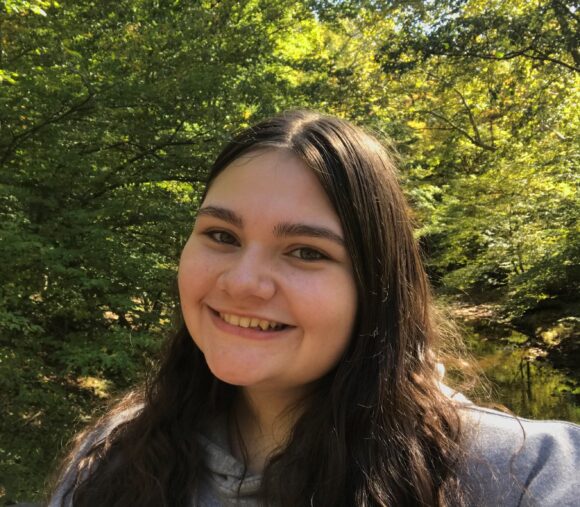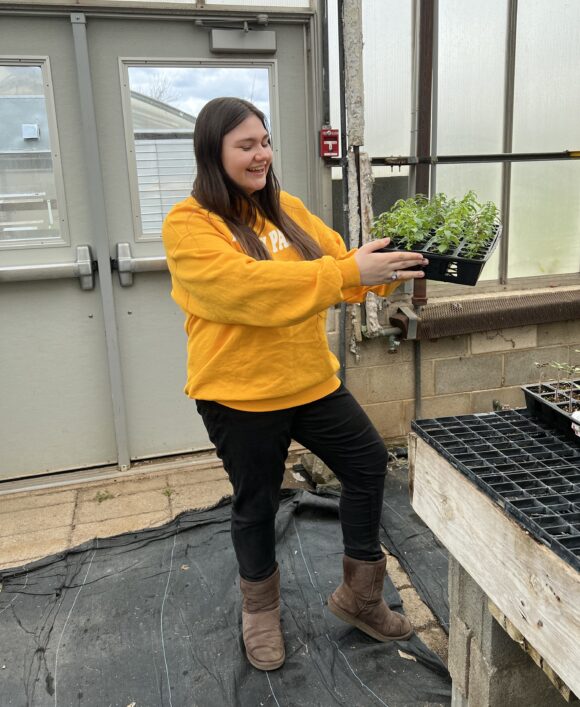
Jennifer Obrizan (SEBS’22)
Jennifer Obrizan transferred to the School of Environmental and Biological Sciences (SEBS) as a junior in fall 2020 after graduating from Middlesex County College with her associates degree in biology. She chose to attend Rutgers University specifically for its 4+1 Agricultural Science Education program—a joint program with SEBS and the Graduate School of Education (GSE). She counts this as a significant moment in her undergraduate journey.
The seed that grew into a desire to teach agri-science was planted during Obrizan’s high school career at East Brunswick Vocational and Technical School where she graduated in 2018. She was enrolled in an agri-science technology shop class for four years, and in her junior year, became increasingly involved in helping her classmates with the curriculum. Her teacher even had her teach a few lessons in her junior year. Obrizan enjoyed this so much that she began to seriously consider becoming a teacher.
Obrizan was drawn to agriculture because of its versatility. “Agriculture encompasses so much more than the stereotypical farming aspect most people immediately think of,” she said. “I can focus on plant, animal, or food science, agronomy, plant pathology, or entomology, and even these options are just a few potential career paths. The possibilities are endless.”
She discovered, however, that because she was a transfer student, 4+1 Agricultural Science Education program would be harder to apply to because other students applying to GSE normally begin in their sophomore year and she would, therefore, have courses to make up. Obrizan persevered, taking 18.5 credits her first semester here at Rutgers, then a winter course, and then 21 credits the following spring!
The reason for the large course overload was not only due to the 4+1 program, but because she decided to double major in Agriculture and Food Systems: Teacher Education Track and Plant Biology Horticulture and Turf Industry.
Because her community college did not have an agriculture-based major, it was recommended that she major in Biology instead. During the transfer process, Obrizan explored the various plant biology majors and minors. Doing a double major while also taking classes for the GSE wouldn’t be easy, but with careful planning she would succeed. She is also double minoring in Agroecology and Education as a Social Science.
Obrizan had been attending Rutgers Day at the school since she was quite young and was very familiar with the Cook/Douglass campus. So, when she found out she could get her masters at Rutgers in only five years, her decision was made.
Meeting that goal meant that summer of 2021was dedicated to taking two Curriculum for Agricultural Science Education (CASE) institutes—each lasting eight days—which certifies her to teach in the two areas: CASE Agriculture, Food, and Natural Resources as well as CASE Principles of Agricultural Science-Plant. And because Rutgers was the host school for CASE Principles of Agricultural Science-Plant, she received graduate credits for completing the institute.
In fall 2021, Obrizan took Plant Diversity and Evolution along with its lab. The course was challenging but she learned a lot of valuable information that will help her in the future as an agricultural educator. The course also introduced her to the Chrysler Herbarium located on the Douglass campus, where she worked to complete her experience-based education requirement.
She considers it one of the best choices she has made at Rutgers. Describing the work she does there as “incredibly fulfilling,” Obrizan believes it has made a difference. “Whether it was adding skeletal records and barcoding specimens, mounting specimens onto sheets to add them to the collection, name checking species and determining if there have been any changes to botanical names and correcting them, or simply imaging them so they can be uploaded to a database,” she knows that the work she’s done will outlive her. The specimens are hundreds of years old, she is quite literally working with history!
It’s not surprising that time management and planning are two of the most valuable skills Obrizan acquired during her undergraduate career. Before she even arrived at Rutgers, she looked at Degree Navigator and created a document of all of the classes she needed to complete, as well as all of the potential electives she could take, choosing those she was most interested in and noting the semesters during which they were offered.

Jennifer Obrizan (SEBS’22) was teaching plant science in the greenhouse. Photo courtesy of Jennifer Obrizan.
She created a chart to mark her progress and in doing so, realized that she could add that second major by wisely choosing her electives. On top of that, Obrizan is also student teaching on Tuesdays and Thursdays this semester, so all of the intricate, careful planning meant she could take a lighter course load than normal, to make room for the teaching.
Obrizan considers the most challenging thing about college to be the sense of independence that one needs to acquire. She quickly learned that if she wanted to accomplish something, she needed to take responsibility for it. Meeting with her advisors this semester and confirming that she had met all of the requirements for graduation was one of the most rewarding feelings she has ever experienced. All of her hard work has paid off!
Obrizan has accomplished a lot in her two years at Rutgers. And making the Dean’s List for Fall 2020, Spring 2021, and Fall 2021 (so far) is evidence of Obrizan’s commitment. She has also been honored with the position of Gonfalonier (standard bearer) for the SEBS 2022 Convocation this May.
“Jennifer has been an outstanding student throughout her time at Rutgers,” said Xenia Morin, associate teaching professor, Department of Plant Biolgy and undergraduate program director for the Agriculture and Food Systems Program. “Her organization and dedication to her studies as well as dedication to her students in her student teaching are impressive. I have always enjoyed having her in my classes. She is the top undergraduate student in the agriculture and food systems program who will graduate this year and I’m excited to announce that she will be the recipient of the program’s graduation award for academic excellence in agricultural education.”
This summer Obrizan will be taking classes with the GSE. In addition to the one required class for her master’s degree, she will also be taking two courses to work towards completing the endorsement for being a Teacher of Students with Disabilities, a required certification if your degree isn’t in special education. She also plans to become certified to teach more CASE courses.
Currently her interests focus on animal and plant biotechnology, food science and safety, and natural resources and ecology. She hopes to have a job lined up to begin teaching agriculture for the 2023-2024 school year.
Her advice for those embarking on a Rutgers degree? “Don’t be afraid to reach out and ask questions, because you are in charge of your own future.” Clearly advice that Obrizan has followed herself.
Congratulations and here’s to her bright future!

